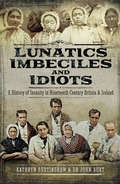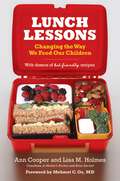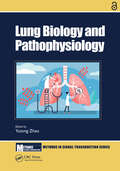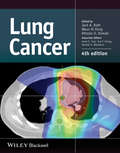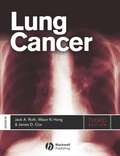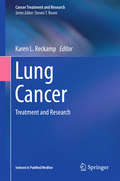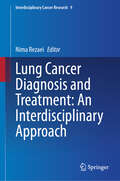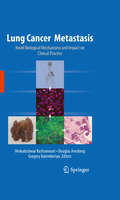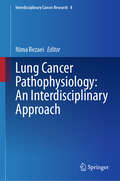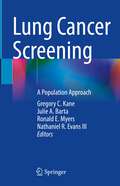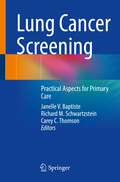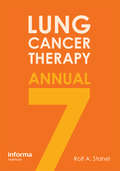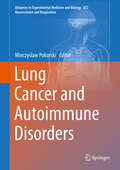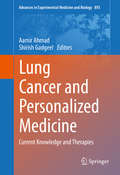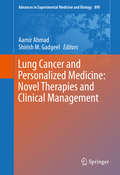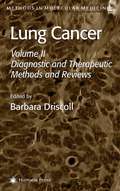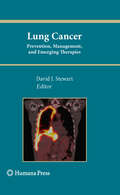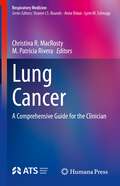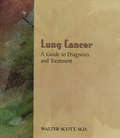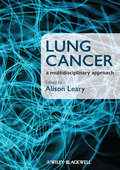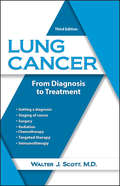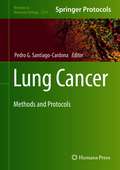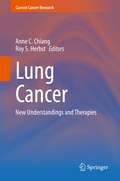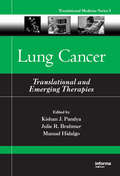- Table View
- List View
Lunatics, Imbeciles and Idiots: A History of Insanity in Nineteenth-Century Britain and Ireland
by Kathryn Burtinshaw Dr. John Burt&“Reveals the grisly conditions in which the mentally ill were kept . . . [and] harrowing details of the inhumane and gruesome treatment of these patients.&”—Daily Mail In the first half of the nineteenth century, treatment of the mentally ill in Britain and Ireland underwent radical change. No longer manacled, chained and treated like wild animals, patient care was defined in law and medical understanding, and treatment of insanity developed. Focusing on selected cases, this new study enables the reader to understand how progressively advancing attitudes and expectations affected decisions, leading to better legislation and medical practice throughout the century. Specific mental health conditions are discussed in detail and the treatments patients received are analyzed in an expert way. A clear view of why institutional asylums were established, their ethos for the treatment of patients, and how they were run as palaces rather than prisons giving moral therapy to those affected becomes apparent. The changing ways in which patients were treated, and altered societal views to the incarceration of the mentally ill, are explored. The book is thoroughly illustrated and contains images of patients and asylum staff never previously published, as well as first-hand accounts of life in a nineteenth-century asylum from a patient&’s perspective. Written for genealogists as well as historians, this book contains clear information concerning access to asylum records and other relevant primary sources and how to interpret their contents in a meaningful way. &“Through the use of case studies, this book adds a personal note to the historiography in a way that is often missing from scholarly works.&”—Federation of Family History Societies
Lunch Lessons: Changing the Way America Feeds Its Child
by Lisa Holmes Ann CooperRemember how simple school lunches used to be? You'd have something from every major food group, run around the playground for a while, and you looked and felt fine. But today it's not so simple. Schools are actually feeding the American crisis of childhood obesity and malnutrition. Most cafeterias serve a veritable buffet of processed, fried, and sugary foods, and although many schools have attempted to improve, they are still not measuring up: 78 percent of the school lunch programs in America do not meet the USDA's nutritional guidelines.Chef Ann Cooper has emerged as one of the nation's most influential and most respected advocates for changing how our kids eat. In fact, she is something of a renegade lunch lady, minus the hairnet and scooper of mashed potatoes. Ann has worked to transform cafeterias into culinary classrooms. In Lunch Lessons, she and Lisa Holmes spell out how parents and school employees can help instill healthy habits in children.They explain the basics of good childhood nutrition and suggest dozens of tasty, home-tested recipes for breakfast, lunch, and snacks. The pages are also packed with recommendations on how to eliminate potential hazards from the home, bring gardening and composting into daily life, and how to support businesses that provide local, organic food.Yet learning about nutrition and changing the way you run your home will not cure the plague of obesity and poor health for this generation of children. Only parental activism can spark widespread change. With inspirational examples and analysis, Lunch Lessons is more than just a recipe book—it gives readers the tools to transform the way children everywhere interact with food.
Lung Biology and Pathophysiology (Methods in Signal Transduction Series)
by Yutong ZhaoThe lungs are the organ for gas exchange between the body and the external environment. Dysfunction of upper airway epithelium and smooth muscle cells leads to pathogenesis of asthma, chronic obstructive pulmonary disease (COPD), cystic fibrosis, and other conditions, resulting in airway inflammation and narrowing. Injury to alveolar epithelium and endothelium causes influx of neutrophil and protein-rich fluid from circulation, resulting in edema and disruption of gas exchange. In addition to lung structural cells, immune cells, including alveolar macrophages and lymphocytes play critical roles in the maintenance of lung function. This book contributes to the understanding homeostasis of lung cells in the physiological and pathological conditions critical to the development of novel therapeutics.Key Features Highlights the role the lungs play as an interface between the body and the environment Describes the underlying mechanism of lung diseases Emphasizes the ways nutrition contributes to lung health as well as the ways pollution adversely affect lung function Includes contributions from leading researchers Chapters 8 and 13 of this book are available for free in PDF format as Open Access from the individual product page at www.routledge.com. It has been made available under a Creative Commons Attribution-Non Commercial-No Derivatives 4.0 license.
Lung Cancer
by Jack A. Roth Waun Ki Hong Ritsuko U. KomakiThe best and most concise single source for state-of-the-art diagnosis and treatment of lung cancer -newly revised, updated, and expanded.Lung cancer has long been the number-one cause of death from cancer every year and the third most frequently diagnosed after breast and prostate cancers. In 2010, about 15% of all cancer diagnoses and 30% of all cancer deaths were due to lung cancer. Needless to say, there is a great need for more rapid advancements in diagnosis and treatment of this devastating disease.Here is the comprehensively revised, updated, and expanded edition of the well-established, evidence-based reference book that deals with the most recent advances in lung cancer prevention, screening, diagnosis, research, and treatment for the clinician. Edited and authored by leading authorities in the field, this Fourth Edition of the highly regarded Lung Cancer is better than ever -featuring nine new chapters along with seven re-formatted ones that are nearly brand new in content and approach. It covers Smoking Prevention and Cessation; Molecular Profiling; Somatic Genome Alterations in Human Lung Cancers; Management of Multi-Focal Bronchioloalveolar Carcinoma (BAC); Primary Tracheal Tumors; Predictive Tumor Biomarkers for EGFR Inhibitors; Non-Small Cell and Small-Cell Lung Carcinoma; and more.This Fourth Edition of Lung Cancer:Provides the very latest research in the identification of biomarkers to predict a high risk for developing lung cancer - vital for implementing screening, diagnosis, and prevention strategiesPresents the newest lung cancer staging system, as well as updated and cutting-edge surgical and radiation therapy techniques that make local tumor control more effective and less invasive while sparing normal tissuesDiscusses combined modality therapy and new chemotherapeutic agents which are yielding higher response rates and improved survival when used in the adjuvant setting or concurrent with highly sophisticated radiation or proton treatmentOffers novel and emergent approaches to preventative, diagnostic, and therapeutic modalities with an emphasis on the best evidence available from the latest studies and clinical trialsWith almost half of the revised and updated content being brand new, Lung Cancer, Fourth Edition, is an important and vital resource for all medical professionals and students involved in the care and treatment of those struck with this catastrophic illness.
Lung Cancer
by Jack A. RothLung cancer is a major cause of cancer-related deaths in men and women. However, since the first edition of Lung Cancer was published 14 years ago, rapid progress in the biology, prevention, diagnosis, and treatment of the disease has been made.
Lung Cancer
by Karen L. ReckampThis book describes the molecular mechanisms of lung cancer development and progression that determine therapeutic interventions in the era of genomics, when the rapid evolution in lung cancer diagnosis and treatment necessitates critical review of new results to integrate advances into practice. The text opens with background and emerging information regarding the molecular biology of lung cancer pathogenesis. Updated results regarding lung cancer prevention and screening are discussed, followed by chapters on diagnostic techniques and pathological evaluation. This leads on to a detailed presentation of treatment modalities, from surgery and radiation therapy to standard chemotherapy and targeted agents. The coverage includes resistance to therapy and the emergence of immunotherapy for lung cancer; in addition, the current evidence in respect of small cell lung cancer is summarized. The book presents insights from experts across disciplines to emphasize the importance of collaborative care. Advances in our understanding of issues in geriatric oncology and palliative care complete the comprehensive discussion of lung cancer.
Lung Cancer Diagnosis and Treatment: An Interdisciplinary Approach (Interdisciplinary Cancer Research #9)
by Nima RezaeiThe “Lung Cancer Diagnosis and Treatment: An Interdisciplinary Approach” is the ninth volume of the “Interdisciplinary Cancer Research” series, publishes comprehensive reviews on the diagnosis and treatment of lung cancer. Application of artificial intelligence in lung cancer detection is explained well. Recent advances in the treatment of lung cancer is presented in this volume, while opportunities and challenges in immunotherapy are discussed. This interdisciplinary series is of special value to researchers working on oncology. This is the main concept of Cancer Immunology Project (CIP), which is a part of Universal Scientific Education and Research Network (USERN). This interdisciplinary book will be of special value to researchers, oncologists, and oncosurgeons who wish to extend their knowledge on lung cancer.
Lung Cancer Imaging
by James G. RavenelWhile specialists often guide the care to lung cancer patients, it is often a general radiologist who is left to interpret studies that impact patient care and management. Lung Cancer Imaging provides a comprehensive guide to the diagnosis, staging and overview of the management of lung cancer relevant to practicing radiologists so that they can better understand the decision making issues and provide more directed and useful communication to the treating physicians. It Primary Care physicians will also find this book valuable to understand the relevant issues that they face when one of their patients is being treated for lung cancer.
Lung Cancer Metastasis
by Gregory Kalemkerian Venkateshwar Keshamouni Douglas ArenbergLung cancer is the leading cause of cancer-related mortality. Metastatic lung cancer is responsible for more than ninety percent of lung cancer related deaths. However, relatively little progress has been made in understanding the process of lung cancer metastasis. The two main aims of this book are a) to introduce clinical aspects to basic scientists and basic molecular and cellular concepts to clinical investigators, in order to promote collaboration and foster much needed translational research; and b) to introduce new and emerging concepts and approaches in metastasis research to lung cancer research community at large. In this attempt, the book will cover a broad spectrum of subjects ranging from the current trends in the clinical management of the metastatic disease, to the systems biology approach for gaining insights into the mechanisms of metastasis. Some of the subjects covered will include: defining basic hallmarks of a metastatic cell, the concept of tumor stem cells, epithelial-mesenchymal transitions, evasion of immune-surveillance, tumor-stromal interactions, angiogenesis, molecular imaging and biomarker discovery.
Lung Cancer Pathophysiology: An Interdisciplinary Approach (Interdisciplinary Cancer Research #8)
by Nima RezaeiLung cancer is one of the most common cancers and the leading cause of deaths worldwide. The eighth volume of the “Interdisciplinary Cancer Research” series, entitled “Lung Cancer Pathophysiology: An Interdisciplinary Approach” publishes comprehensive reviews on the mechanisms of lung cancer. Fundamental elements of a lung cancer multidisciplinary team are discussed. The epithelial to mesenchymal transition in lung cancer, and the roles of tumor immune microenvironment, NK cells, RNA, micro-RNA, and long-non coding RNA in lung cancer are explained. A comprehensive genomic profiling in lung cancer in the era of immunotherapy approaches is also provided in this volume. This interdisciplinary series is of special value to researchers working on oncology. This is the main concept of Cancer Immunology Project (CIP), which is a part of Universal Scientific Education and Research Network (USERN). This interdisciplinary book will be of special value to researchers, oncologists, and oncosurgeons who wish to extend their knowledge on lung cancer.
Lung Cancer Screening: A Population Approach
by Gregory C. Kane Julie A. Barta Ronald E. Myers Nathaniel R. Evans IIIThis book is a comprehensive guide to lung cancer screening for clinicians, healthcare systems, community leaders, and public health officials with the hope of creating a more equitable landscape in both lung cancer screening and lung cancer-related outcomes, at local, state, and national levels. Authors take a new approach to primary and secondary lung cancer prevention that is in the early stages of adoption in the United States. The last decade ushered in recognition of screening as an effective intervention, but unfortunately, despite the wide acceptance of the importance of this new screening modality, nationally, not more than 5% of eligible subjects have undergone screening to date in the United States, although in some states uptake has reached as high as 16%. As is common with any new preventive cancer screening, racial and socioeconomic disparities emerge in utilization, stage at diagnosis, and mortality. Over time, these disparities decline, but consequential differences endure. Therefore, it is critical to establish equitable screening practices. The true measure of the effectiveness of any lung cancer screening program needs to be viewed through the lens of its impact on populations, including those most affected by the morbidity and mortality of smoking-related illness and lung cancer. As such, this book emphasizes a number of important public health topics, including community outreach to vulnerable populations, social justice issues, addressing stigma and fatalism in the general community, and the use of geocoding to assess a program’s impact at a population level. This book weaves traditional topics related to lung cancer screening, such as promoting initial and repeat screening, interpreting Lung RADs, and managing the follow-up of findings, into the population perspective in order to present a unified, comprehensive approach to the subject. Further, it serves as a guide that health systems, health care professionals, community leaders, and other stakeholders can use to achieve the promise of lung cancer screening.
Lung Cancer Screening: Practical Aspects for Primary Care
by Richard M. Schwartzstein Janelle V. Baptiste Carey C. ThomsonLung cancer is the second most diagnosed cancer and remains the leading cause of cancer-related deaths in the United States. The high mortality is largely the consequence of late diagnosis; lung cancer is typically asymptomatic in early stages when a surgical cure is most likely. As a result, there has been great interest in and research on early detection of lung cancer through screening. There is evidence for reduced disease-specific mortality through screening for lung cancer. However, creating an integrated, systematic approach to lung cancer screening remains a challenge for providers. A successful lung cancer screening program weighs the benefits and harms of screening, clearly defines the target population and the screening process, and does not exclude eligible patient populations based on race, ethnicity, or socioeconomic status, In addition it should promote shared decision-making and address risk reduction. Lung Cancer Screening: Essentials for Primary Care provides a comprehensive and pragmatic guide to screening for lung cancer in real world clinical practice. The first two chapters summarize the epidemiology, risk factors and disparities in lung cancer, and provide the evidence base for screening for lung cancer. The disparities in lung cancer among different groups within the US population are well known. This text highlights how health disparities in lung cancer affect screening and have led to modification of lung cancer screening guidelines. Subsequent chapters provide a guide to implementing a successful lung cancer screening program and address the barriers that arise during implementation. The book concludes with real-world solutions to overcoming barriers in lung cancer screening. This pocket guide is an essential read and bookshelf reference for providers who do not have the specialized knowledge of screening for lung cancer. It also appeals to pulmonologists, fellows in Pulmonary Medicine, chest radiologists, and advanced practice providers with an interest in setting up lung cancer screening in any clinical practice.
Lung Cancer Therapy Annual 7
by Rolf A. StahelOncology research and practice in lung cancer continues to develop rapidly. This latest edition of Lung Cancer Therapy Annual briefs the oncology community with a review of the recent literature, emphasizing the therapeutic aspects. It offers an update of the impact that this information will have on the day-to-day management of the lung cancer pat
Lung Cancer and Autoimmune Disorders
by Mieczyslaw PokorskiLung cancer and autoimmune diseases are complex entities in that they involve gene disturbance, gene polymorphism, and impaired gene repair mechanisms. The volume focuses on altered gene expression in tumor processes and in chronic autoimmune disorders. The chapters discuss the biological rationale for novel disease protein markers, present relevant clinical results, and give some diagnostic and therapeutic tips.
Lung Cancer and Personalized Medicine
by Aamir Ahmad Shirish GadgeelThis, the first of two volumes on personalized medicine in lung cancer, touches on the core issues related to the understanding of lung cancer--statistics and epidemiology of lung cancer--along with the incidence of lung cancer in non-smokers. A major focus of this volume is the state of current therapies against lung cancer--immune, targeted therapies against EGFR TKIs, KRAS, ALK, angiogenesis; the associated challenges, especially resistance mechanisms; and recent progress in targeted drug development based on metal chemistry. Chapters are written by some of the leading experts in the field, who provide a better understanding of lung cancer, the factors that make it lethal, and current research focused on developing personalized treatment plans. With a unique mix of topics, this volume summarizes the current state-of-knowledge on lung cancer and the available therapies.
Lung Cancer and Personalized Medicine: Novel Therapies and Clinical Management
by Aamir Ahmad Shirish M. GadgeelThis, the second of two volumes on personalized medicine in lung cancer, touches upon the recent progress in targeted drug development based on genomics; emerging biomarkers and therapeutic targets such as EMT, cancer stem cells, and the tumor microenvironment; current personalized clinical management and radiation therapy for lung cancers; and the promise of epigenetics and next-generation sequencing for the advancements towards personalized therapy of lung cancer patients. With chapters on state-of-the-art therapies and technologies written by leading experts working to develop novel companion diagnosis tools for the personalized treatment of lung cancer patients, this volume brings readers up-to-date by presenting the current knowledge on the efforts to make personalized management of lung cancer patients a reality.
Lung Cancer, Volume 2: Diagnostic and Therapeutic Methods and Reviews
by Barbara DriscollLeading physician scientists and noted researchers review novel methods for determining the etiology of a variety of lung cancers and present readily reproducible techniques for examining the associated multitude of genetic abnormalities. The methods make it possible to detect these alterations at the cellular, DNA, and protein levels, to study the development of lung cancer in vitro and in vivo-either in situ or in the form of metastases, and to test targeted therapies with detailed model systems. An animal models section gives explicit instructions for setting up and testing these systems, which are rarely described in the literature.
Lung Cancer:
by David J. StewartThis comprehensive resource provides authoritative knowledge of the most up-to-date prevention and treatment strategies for thoracic malignancies. Established and investigational therapies are placed in the context of tumor biology for a full understanding of the pharmacogenetics, etiology, and changing epidemiology of lung cancer. Expert clinicians detail the function of predictive and prognostic factors in the utilization of chemo-radiotherapy, adjuvant and neoadjuvant treatment, and targeted agents. The promises and potential pitfalls of investigational strategies are evaluated with exceptional insight and clarity, with unique attention paid to the mechanisms of drug resistance and targets for lung cancer treatment and prevention. Lung Cancer: Prevention, Management, and Emerging Therapies engages the entire spectrum of therapeutic modalities with focus on systemic approaches. Disease coverage includes newly diagnosed and recurrent non-small cell lung cancer, small cell carcinoma, and mesothelioma. Critical examination of the impact, methodology, and design of clinical trials is presented along with new paradigms for personalized approaches and individual risk assessment.
Lung Cancer: A Comprehensive Guide for the Clinician (Respiratory Medicine)
by Christina R. MacRosty M. Patricia RiveraThis book provides a comprehensive yet succinct update for the clinician in the diagnosis, staging, and treatment of lung cancer. Lung cancer is a leading cause of death in the US and worldwide and its prevention, screening, and treatment is a large part of clinical practice across specialties. Frequent updates in recommendations and guidelines in screening, diagnosis, staging, treatment, and management are vital, and it can be difficult for the busy clinician to stay up to date. This book provides a comprehensive update for the chest clinician across the continuum of lung cancer care. Each of the thirteen chapters covers a specific component of lung cancer care and is written by experts in the field who are practicing clinicians. The objectives are to provide an organized and easily-referenced resource for the chest clinician; to provide comprehensive evidence-based information on the following topics: lung cancer screening and prevention, approach to lung nodules, diagnosis and staging of lung cancer, treatment of lung cancer, pleural disease in lung cancer, and treatment complications; and to provide source information for clinicians so they can stay up-to-date on any new guidelines or recommendations related to lung cancer screening, tobacco treatment, staging, and diagnosis. This book is written specifically for the busy clinician that focuses on clinically relevant and evidence-based principles around lung cancer while providing references for ease of finding source information to enable clinicians to stay updated as guidelines change. This is an ideal guide for practicing pulmonary clinicians, practicing general practice clinicians, trainees in chest and general medicine, as well as some advanced practice providers who need a refresher.
Lung Cancer: A Guide to Diagnosis and Treatment
by Walter J. ScottWhat is my prognosis? What are my treatment options? Which therapies would be the most effective for my stage of lung cancer? These and other frequently asked questions are addressed in this crucial reference designed to help patients educate themselves and obtain the best possible treatments. The completely revised second edition has been updated to include a discussion of the movement towards customized chemotherapy; treatment options for early-stage lung cancer including minimally invasive surgery; and the most promising treatments, among them multimodality therapy—a combination of surgery, chemotherapy, and radiation. Dr. Scott also surveys tests for early detection of lung cancer, talks about the importance of cancer staging, examines alternative treatments, and offers advice on coping with emotions such as "smoker's guilt."
Lung Cancer: A Multidisciplinary Approach
by Alison LearyLung Cancer: A Multidisciplinary Approach provides clinicians with a comprehensive text that can be used when caring for patients with lung cancer throughout the entire patient journey. This edited collection explores the aetiology of lung cancer; mesothelioma; the range of available treatments, including chemotherapy and radiotherapy; surgical care; supportive and end-of-life care; quality-of-life issues; and the role of the nurse within the multidisciplinary team. A comprehensive, evidence-based guide to lung cancer Illustrative case studies used throughout Contributions from respected healthcare professionals in the field Interprofessional in focus Lung Cancer: A Multidisciplinary Approach is an essential resource for all nurses and healthcare professionals working with cancer patients.
Lung Cancer: From Diagnosis to Treatment
by Walter ScottAccording to the American Cancer Society, nearly 220,000 Americans are diagnosed with lung cancer annually. It accounts for nearly 15 percent of all newly diagnosed cancers. If you've been diagnosed, you probably have many questions about the nature of the disease and your treatment options.Walter J. Scott, M.D., has treated thousands of lung cancer patients who have navigated this overwhelming maze of medical tests and procedures. In Lung Cancer: From Diagnosis to Treatment, Dr. Scott helps you understand the process—from getting a diagnosis to going through treatment. He explains topics such as: symptoms of lung cancer, diagnostic tests, types and stages of lung cancer, surgical procedures, chemotherapy, radiation therapy, clinical trials, coping with "smoker's guilt" and more. A book to help you become an informed patient!
Lung Cancer: Methods and Protocols (Methods in Molecular Biology #2279)
by Pedro G. Santiago-CardonaThis detailed book serves as a laboratory manual containing vital protocols and in-depth discussion involving commonly used experimental approaches for the characterization of several aspects of lung tumor biology. Beginning with an extensive section on biomarker detection, the volume continues with chapters on the genetic and molecular characterization of lung cancer biological samples as well as protocols for the generation of research tools and pre-clinical lung cancer models. Written for the highly successful Methods in Molecular Biology series, chapters include introductions to their respective topics, lists of the necessary materials and reagents, step-by-step, readily reproducible protocols, and tips on troubleshooting and avoiding known pitfalls. Authoritative and practical, Lung Cancer: Methods and Protocols provides a global perspective of research efforts related to lung cancer, while allowing researchers to experimentally probe the different aspects of lung cancer research, including the experimentally relevant tests used in the establishment of lung cancer diagnosis and prognosis, in their laboratories.
Lung Cancer: New Understandings and Therapies (Current Cancer Research)
by Anne C. Chiang Roy S. HerbstLung cancer has seen a paradigm shift in disease treatment over the past few years, with major changes in the therapeutic drugs now available as well as in the overall management approach. For targeted and immunotherapeutic approaches, understanding the biology of acquired resistance is a key strategy that has yielded productive advances in the subsequent treatment. Future advances also include incorporating biomarker data obtained from solid and liquid biopsies, as well as combination of immunotherapy with radiotherapy and in special populations such patients with CNS involvement.
Lung Cancer: Translational and Emerging Therapies
by Manuel Hidalgo Kishan J. Pandya Julie R. BrahmerLung cancer is the leading cause of cancer-related deaths in the United States. Filling a gap in the literature, this resource translates recent laboratory findings into practical applications for the prevention and control of lung cancer. Featuring chapters by seasoned researchers in the field, this reference reviews current advances in imaging, d
